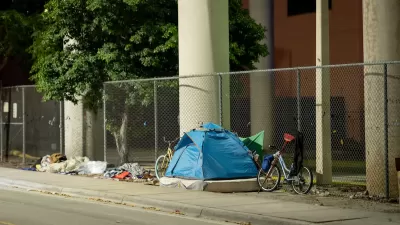President Trump recently ordered the clearing of encampments built by unhoused people on federal land in Washington, D.C.

In an opinion piece in Greater Greater Washington, Susannah Petitt argues that destroying the encampments formed by unhoused people in Washington, D.C., a move ordered by a Trump executive order, does nothing to stem the homelessness crisis.
Like many advocates for homeless Americans, Petitt points to the systemic problems that are pushing more people into homelessness. “While removing these encampments may make the city’s homeless residents less visible, it will do little to get to the root of the problem. When policymakers only see homelessness as an aesthetic problem, they miss the people and stories inside the encampments they wish to destroy.”
Destroying the relatively safe places people have found in encampments misses the real problem in DC, and will do little to improve safety. Ending homelessness requires supportive services that meet the needs of people where they are. Destroying encampments is just hiding homelessness from the view of the West Wing.
According to Petitt, reducing homelessness requires coordinated support from governments, community organizations, and social networks. “If the DC government and President Trump are serious about getting the homeless off the streets, they should emphasize community care by better supporting outreach efforts by nonprofits and individuals, not destroying encampments.” As individuals, Petitt urges people to take a minute to meet their homeless neighbors and offer a gesture of assistance or support.
FULL STORY: Destroying encampments won’t reduce homelessness in DC

Planetizen Federal Action Tracker
A weekly monitor of how Trump’s orders and actions are impacting planners and planning in America.

Map: Where Senate Republicans Want to Sell Your Public Lands
For public land advocates, the Senate Republicans’ proposal to sell millions of acres of public land in the West is “the biggest fight of their careers.”

Restaurant Patios Were a Pandemic Win — Why Were They so Hard to Keep?
Social distancing requirements and changes in travel patterns prompted cities to pilot new uses for street and sidewalk space. Then it got complicated.

Albuquerque Route 66 Motels Become Affordable Housing
A $4 million city fund is incentivizing developers to breathe new life into derelict midcentury motels.

DC Area County Eliminates Bus Fares
Montgomery County joins a growing trend of making transit free.

Platform Pilsner: Vancouver Transit Agency Releases... a Beer?
TransLink will receive a portion of every sale of the four-pack.
Urban Design for Planners 1: Software Tools
This six-course series explores essential urban design concepts using open source software and equips planners with the tools they need to participate fully in the urban design process.
Planning for Universal Design
Learn the tools for implementing Universal Design in planning regulations.
Heyer Gruel & Associates PA
JM Goldson LLC
Custer County Colorado
City of Camden Redevelopment Agency
City of Astoria
Transportation Research & Education Center (TREC) at Portland State University
Camden Redevelopment Agency
City of Claremont
Municipality of Princeton (NJ)





























